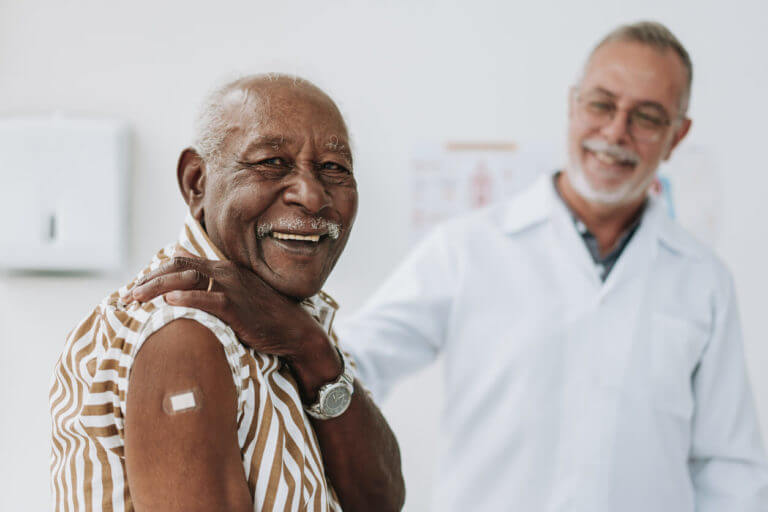
Prevention of infectious diseases remains one of today’s most important healthcare challenges. Your primary care provider helps advance this goal by delivering vaccines and educating patients on public health measures to avoid the spread of flu, COVID-19 and more.
Here is what to expect from your PCP as you partner in preventing and combating illness.
What Are Vaccines?
Vaccines are lab-processed medications that contain inactive or weakened forms of disease-causing microorganisms. They stimulate the body’s built-in defenses when introduced into the body through injection or other means. This natural and powerful immunity protects against future infection.
Vaccines are among the most effective tools for preventing infectious diseases. They have helped eradicate smallpox and significantly reduced polio cases in developed countries. Vaccines also successfully combat the incidence of other potentially deadly illnesses such as measles, mumps, rubella, and more.
What Are the Various Kinds of Vaccines?
There are a large number of vaccines available to help children, adults, and seniors stay healthy. Pediatricians and family care providers typically deliver children’s vaccines according to schedules devised by the Centers for Disease Control and/or the American Academy of Pediatrics. Adults receive their vaccines according to age, health, occupation, and other risk factors.
Some of the most common types of vaccines include the following:
Live-attenuated Vaccines
These are made from weakened forms of the viruses or bacteria. Vaccines work by stimulating a natural immune response in the body to provide long-lasting protection against the actual disease.
Inactivated Vaccines
These are made from dead or inactive versions of a virus or bacteria. They do not cause illness but still trigger protective immunity.
Subunit, Recombinant, Polysaccharide, and Conjugate Vaccines
These vaccines use components of a virus or bacteria (such as proteins or sugars) to stimulate immunity. They are used for diseases that cannot be prevented through live-attenuated or inactivated vaccines. Examples include the flu vaccine which contains subunits of the influenza virus, and the meningococcal conjugate vaccine.
Live Vaccines
These contain weakened versions of live viruses or bacteria. However, they do not cause illness in healthy individuals. Instead, they stimulate a strong immune response. An example of DNA and mRNA vaccines is the COVID-19 vaccine.
DNA and mRNA Vaccines
These newer types of vaccines use genetic material from a virus or bacteria to stimulate an immune response. They have shown promising results in recent years but are still being studied and developed. An example of DNA and mRNA vaccines are the COVID-19 vaccines.
How Does Your Primary Care Provider Deliver Vaccinations?
Your PCP will tell you what vaccines are recommended for your age and health status. Typically, injection is the method of delivery. However, some vaccines can be given orally or through skin patches.
Before receiving a vaccine, your PCP will review your medical history and determine if you have any contraindications or allergies to the vaccine. You also will discuss potential side effects and any concerns you may have.
During the actual vaccination process, your PCP will administer the vaccine using a sterile needle and syringe. You will be monitored for any immediate reactions. Afterward, you will receive information regarding booster shots as needed.
Why Are Vaccinations Important?
Vaccines are essential in preventing the spread of infectious diseases from individual to individual and throughout the community. Epidemiologists, or experts in disease control, maintain that vaccinations save numerous lives each year. They have also helped eradicate diseases such as smallpox and nearly eliminated others, such as polio.
By getting vaccinated, you protect yourself and those around you who may be immunocompromised or unable to receive certain vaccines. This general protection is called herd immunity. It helps prevent outbreaks and protects vulnerable individuals.
In other words, vaccines really do impact public health, which is one of the biggest reasons primary care and vaccinations are recommended.
What Else Can You and Your PCP Do to Prevent Infectious Diseases?
Public health is a medical discipline based on scientific research. Public health philosophies and policies have important goals for the individual and for the community at large, including:
- Prevention of disease and injury
- Education on healthy lifestyles
- Responding to health crises, such as epidemics
Both healthcare providers and their patients play key roles in maintaining public health by promoting and practicing healthy lifestyle habits. Additionally, providers identify underlying causes for disease and injury instead of just diagnosing and treating symptoms.
Accordingly, PCPs educate their patients on a wide range of topics, including:
- Proper nutrition and exercise habits to maintain a healthy weight
- Vaccinations to prevent the spread of infectious diseases
- Regular screenings for common illnesses, such as cancer and diabetes
- Safe sex practices
- Mental health awareness and resources
- Identification of risk factors for disease and disability, including heredity, poor nutrition, sedentariness, unsafe sex, stress, and more
Together, patients and their PCPs devise treatment plans to avoid illness and injury. Providers offer accountability by following up with patients and monitoring their progress.
The annual physical examination allows patients to talk one-on-one with their providers, ask questions, and receive guidance on how best to attain and maintain health goals.
Excellent Primary Care for Patients in the West Orange, NJ Area
At Hudson MD Group, we deliver a long list of patient services, including primary care and specialties, such as urology and cardiology. We strive to prevent illness and injury and see our roles in public health as key to serving our community.
To learn more about primary care and vaccinations, and other aspects of public health or to schedule a consultation, call us today at (973) 705-4914 or fill out our online appointment request form.
We are always here to help and wish you and your family to have the best health possible.


